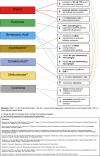The role of inflammation and the possibilities of inflammation reduction to prevent cardiovascular events
- PMID: 35919577
- PMCID: PMC9271640
- DOI: 10.1093/ehjopen/oeac039
The role of inflammation and the possibilities of inflammation reduction to prevent cardiovascular events
Abstract
Chronic systemic inflammation is a risk factor for cardiovascular (CV) disease (CVD). Whether this relationship extends to subclinical inflammation, quantified by values of circulating markers associated with inflammation in the high range of the normal interval, remains debatable. This narrative review evaluates evidence exploring this relationship. A review of pharmacological and non-pharmacological interventions, including diet and lifestyle strategies, supplements, nutraceuticals, and other natural substances aimed at reducing inflammation was also conducted, since few reviews have synthesized this literature. PubMed and EMBASE were used to search the literature and several well-studied triggers of inflammation [oxidized LDL, Lp(a), as well as C-reactive protein (CRP)/high-sensitivity CRP (hs-CRP)] were included to increase sensitivity and address the lack of existing reviews summarizing their influence in the context of inflammation. All resulting references were assessed. Overall, there is good data supporting associations between circulating hs-CRP and CV outcomes. However, the same was not seen in studies evaluating triggers of inflammation, such as oxidized LDL or Lp(a). There is also insufficient evidence showing treatments to target inflammation and lead to reductions in hs-CRP result in improvements in CV outcomes, particularly in those with normal baseline levels of hs-CRP. Regarding pharmacological interventions, statins, bempedoic acid, and apabetalone significantly reduce circulating hs-CRP, unlike PCSK-9 inhibitors. A variety of natural substances and vitamins were also evaluated and none reduced hs-CRP. Regarding non-pharmacological interventions, weight loss was strongly associated with reductions in circulating hs-CRP, whereas various dietary interventions and exercise regimens were not, unless accompanied by weight loss.
Keywords: Cardiovascular disease; Inflammation; hs-CRP.
© The Author(s) 2022. Published by Oxford University Press on behalf of the European Society of Cardiology.
Figures
Similar articles
-
PCSK9 inhibition and inflammation: A narrative review.Atherosclerosis. 2019 Sep;288:146-155. doi: 10.1016/j.atherosclerosis.2019.07.015. Epub 2019 Jul 17. Atherosclerosis. 2019. PMID: 31404822 Review.
-
High-sensitivity C-reactive protein and atherosclerotic disease: from improved risk prediction to risk-guided therapy.Int J Cardiol. 2013 Oct 15;168(6):5126-34. doi: 10.1016/j.ijcard.2013.07.113. Epub 2013 Aug 24. Int J Cardiol. 2013. PMID: 23978367 Review.
-
Comparative effects of 10-mg versus 80-mg Atorvastatin on high-sensitivity C-reactive protein in patients with stable coronary artery disease: results of the CAP (Comparative Atorvastatin Pleiotropic effects) study.Clin Ther. 2008 Dec;30(12):2298-313. doi: 10.1016/j.clinthera.2008.12.023. Clin Ther. 2008. PMID: 19167589 Clinical Trial.
-
Justification for the Use of Statins in Primary Prevention: an Intervention Trial Evaluating Rosuvastatin (JUPITER)--can C-reactive protein be used to target statin therapy in primary prevention?Am J Cardiol. 2006 Jan 16;97(2A):33A-41A. doi: 10.1016/j.amjcard.2005.11.014. Epub 2005 Dec 1. Am J Cardiol. 2006. PMID: 16442935 Review.
-
High-sensitivity C-reactive protein and low-density lipoprotein cholesterol association with incident of cardiovascular events: Isfahan cohort study.BMC Cardiovasc Disord. 2022 May 25;22(1):241. doi: 10.1186/s12872-022-02663-0. BMC Cardiovasc Disord. 2022. PMID: 35614388 Free PMC article.
Cited by
-
Whole Body Vibration Training Has No Effect on Vascular Endothelial and Inflammatory Markers in Young Healthy Women.J Clin Med. 2024 Jul 19;13(14):4228. doi: 10.3390/jcm13144228. J Clin Med. 2024. PMID: 39064268 Free PMC article.
-
The effects of oral trehalose on glycaemia, inflammation, and quality of life in patients with type 2 diabetes: a pilot randomized controlled trial.Arch Med Sci. 2023 Jan 5;19(6):1693-1700. doi: 10.5114/aoms/159048. eCollection 2023. Arch Med Sci. 2023. PMID: 38058700 Free PMC article.
-
PCSK9 Inhibitors Have Apolipoprotein C-III-Related Anti-Inflammatory Activity, Assessed by 1H-NMR Glycoprotein Profile in Subjects at High or very High Cardiovascular Risk.Int J Mol Sci. 2023 Jan 24;24(3):2319. doi: 10.3390/ijms24032319. Int J Mol Sci. 2023. PMID: 36768645 Free PMC article.
-
Sleep and immune health: How dogs, goats and 'factor S' shaped a field.Neurobiol Sleep Circadian Rhythms. 2025 Apr 15;18(Suppl):100118. doi: 10.1016/j.nbscr.2025.100118. eCollection 2025 May. Neurobiol Sleep Circadian Rhythms. 2025. PMID: 40703576 Free PMC article.
-
Evaluating the effect of the antiPCSK9 vaccine on systemic inflammation and oxidative stress in an experimental mouse model.Cardiol J. 2025;32(1):73-82. doi: 10.5603/cj.100585. Epub 2025 Jan 8. Cardiol J. 2025. PMID: 39776050 Free PMC article.
References
-
- Danesh J, Collins R, Appleby P, Peto R. Association of fibrinogen, C-reactive protein, albumin, or leukocyte count with coronary heart disease: meta-analyses of prospective studies. JAMA 1998;279:1477–1482. - PubMed
-
- Craig WY, Neveux LM, Palomaki GE, Cleveland MM, Haddow JE. Lipoprotein(a) as a risk factor for ischemic heart disease: metaanalysis of prospective studies. Clin Chem 1998;44:2301–2306. - PubMed
-
- Langsted A, Kamstrup PR, Nordestgaard BG. High lipoprotein(a) and high risk of mortality. Eur Heart J 2019;40:2760–2770. - PubMed
-
- Koenig W, Löwel H, Baumert J, Meisinger C. C-reactive protein modulates risk prediction based on the Framingham Score: implications for future risk assessment: results from a large cohort study in southern Germany. Circulation 2004;109:1349–1353. - PubMed
Publication types
LinkOut - more resources
Full Text Sources
Research Materials
Miscellaneous



